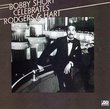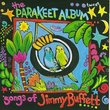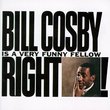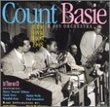| All Artists: Alfred Schnittke, Eri Klas, Stockholm Philharmonic Orchestra Title: Schnittke: Symphony 3 Members Wishing: 1 Total Copies: 0 Label: Bis Release Date: 10/12/1994 Album Type: Import Genre: Classical Styles: Historical Periods, Modern, 20th, & 21st Century, Symphonies Number of Discs: 1 SwapaCD Credits: 1 UPCs: 750582028724, 7318590004777 |
Search - Alfred Schnittke, Eri Klas, Stockholm Philharmonic Orchestra :: Schnittke: Symphony 3
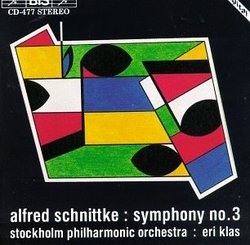 | Alfred Schnittke, Eri Klas, Stockholm Philharmonic Orchestra Schnittke: Symphony 3 Genre: Classical
|
Larger Image |
CD DetailsSimilarly Requested CDs
|
CD ReviewsThe amazing Third! villegem | canada | 11/30/2002 (5 out of 5 stars) "Some second rate maestro told me recently that there was no orchestral music being written in the second half of the XX Century! Obviously Schnittke's Third is proving this music director wrong! Eri Klas was a great friend of Schnittke and is a brilliant conductor and offers a very fine recording of the Third, a symphony that sees the history of western music through Schnittke's prism. As Yuri Bashmet says "they call his music polystylistic when they don't like it. it's only Alfred's language..." At the Schnittke's Festival held in Jan. 2001 at the Barbican in London, Slatkin did an even better job in the last two movements and one may wonder what Polyansky could add to the piece. An old Melodya recording with Rosdentvensky conducting is available in Russia but the overall quality is not as good as this one. A must have for anyone! Even for Hans!" A giant and remarkable musical treasure! Hiram Gomez Pardo | Valencia, Venezuela | 12/23/2006 (5 out of 5 stars) " Schnitke' s Third Symphony is possibly his most daring and ambitious musical project. The impressive orchestral mass' employment, the exploratory character of every one of its four movements and the overwhelming perspective that hovers it, make of this work hard to label it. The sidereal inspiration, the different inflections that remind us to Shostakovich, Mahler, Messian and Hovaness, the memorable Mozart's tribute as well its contemplative zero atmosphere mesmerizes even the most exigent listener. I just wouldn't hesitate for a second, to include it among the most relevant, conspicuous and transcendental artistic feats of the final decades of the past Century. " Apparently I don't hear what some others do G.D. | Norway | 10/19/2009 (3 out of 5 stars) "Schnittke's approach to the symphony was nothing if not iconoclastic, but there is a strong link from his polystylist (yes, polystylist - just as Mahler was polystylist) symphonies to the symphonies of Mahler - as filtered through Berio's Sinfonia (an indisputable masterpiece, by the way). His commitment both to serialism and to pluralism is certainly the foundation for a striking and very personal approach, but the question still remains concerning the overall quality of this music. And this disc of his third symphony does not bring us closer to providing an unequivocal answer to that one.
Schnittke originally intended to explore the acoustical properties of the new Gewandhaus, Leipzig, but gave up his initial concept due to practical difficulties (impossibilities) - although shades of the idea still remains. He also incorporated the monograms of some three dozen composers, including Zimmermann and Stockhausen, the only audible one being probably the B-A-C-H that constitutes the starting point fro the finale. The second, sonata form movement is a pastiche on classicism gradually falling apart and ending in a nightmarish abyss, the scherzo seems meandering and the finale is a huge, sprawling adagio. But what to say as a final verdict? Well, there is something intensely human about the score; small purposeful cells try to make themselves count in the whole fabric of things, gestures sounding meaningful if taken in isolation, but in the making up a chaotic, sprawling, disorienting mess of a tapestry; grey, bloated, threatening, structureless and aimless. I frankly don't know; I have listened to it three times, and I don't feel like going back to this vast, meandering beast; the overall impression is of a musical realization of the fallacy of composition (interesting single parts put together doesn't necessarily make an interesting whole - Mahler was guilty of that one as well, at times). The Stockholm Philharmonic seems to give a committed performance, technically adept and playing with commitment. But much detail seems to be lost (probably due to the very fact that it is a recording, and no fault on the parts of the players). The sound is clear and analytic. In the end then, I am far from convinced that this is really a work worth taking up; I still hold open the possibility that I'm wrong, of course, but at least listening to it have thus far failed to convince me." |

 Track Listings (4) - Disc #1
Track Listings (4) - Disc #1



